Negotiating better deals is a valuable skill that can save you money on purchases large and small. Whether you’re buying a car, negotiating a salary, or haggling over the price of a new appliance, knowing how to negotiate effectively can help you stretch your budget further and get more value for your money. In this blog post, we’ll explore some strategies for honing your negotiation skills and securing better deals in various situations.
Do Your Research:
Before entering into any negotiation, it’s essential to research the product or service you’re interested in purchasing. Know the market value, compare prices from different sellers, and familiarize yourself with any relevant terms or conditions. The more information you have, the better equipped you’ll be to negotiate from a position of strength.
Set Clear Goals:
Define your objectives before entering into negotiations. Decide what outcomes you’re hoping to achieve, whether it’s a lower price, additional features, or better terms. Having clear goals in mind will help you stay focused during negotiations and guide your strategy accordingly.
Practice Active Listening:
Effective negotiation is as much about listening as it is about talking. Pay close attention to what the other party is saying and try to understand their perspective. Ask open-ended questions to encourage them to share more information, and paraphrase their points to demonstrate that you’re actively listening and understanding their concerns.
Be Willing to Walk Away:
One of the most powerful negotiating tactics is the willingness to walk away from a deal if it doesn’t meet your needs or expectations. Communicate your boundaries clearly and be prepared to follow through if the other party isn’t willing to meet your terms. This demonstrates that you’re serious about getting a fair deal and can compel the other party to make concessions.
Emphasize Value, Not Price:
Instead of focusing solely on price, emphasize the value you bring to the table and the benefits of doing business with you. Highlight your strengths, unique selling points, and any additional value-added services you can offer. By framing the negotiation in terms of value rather than price, you can often achieve better outcomes for both parties.
Bundle or Package Offers:
Consider bundling multiple products or services together to create a more attractive offer. Bundling can increase the perceived value of your proposal and provide additional incentives for the other party to agree to your terms. Be strategic in your bundling approach to maximize value while minimizing costs.
Use Silence to Your Advantage:
Silence can be a powerful negotiating tool. After making your offer or stating your terms, resist the urge to fill the silence with unnecessary chatter. Instead, give the other party time to consider your proposal and respond. Often, the first person to speak after a period of silence is the one who loses leverage in the negotiation.
Seek Win-Win Solutions:
Approach negotiations with a collaborative mindset, seeking solutions that benefit both parties. Look for areas of common ground and explore creative ways to address each other’s needs and interests. By fostering a spirit of cooperation, you can build rapport, strengthen relationships, and increase the likelihood of reaching mutually beneficial agreements.

